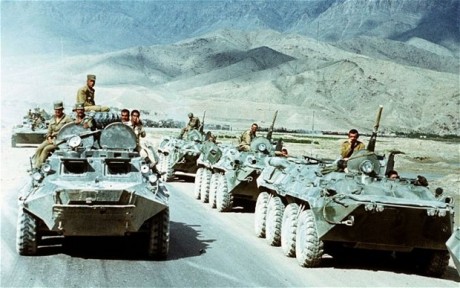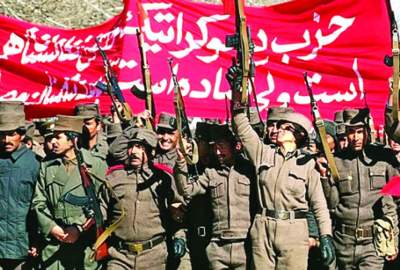It was a holiday in Kabul on Saturday. The traffic was a little lighter and some of the shops were closed. Afghans were marking (in a rather low-key way) Liberation Day, 25 years after Soviet tanks rumbled out of their country. State TV replayed rolling footage of Red Army troops atop tanks and armoured personnel carriers crossing the Hairaton Bridge into Uzbekistan.
The Soviet forces were just the latest invaders to find the country unmanageable. So you don't need to be much of an armchair general or amateur historian to draw parallels with today's Afghanistan. This year American forces – with their British and Nato allies – are on their way home. Hamid Karzai's government is fragile, reviled as a "puppet administration" by its opponents.
Could Kabul collapse in the way it did after the Soviets left, leaving a political vacuum to be filled by civil war and leading ultimately to the rise of the Taliban and the arrival of global terrorist leaders?
The Taliban certainly hope so. In a statement released today they said:
Selfish Americans must learn a lesson from … the Russian defeat and no longer fight a meaningless battle with zealous Afghans and take their invading forces out as soon as possible.
There is no shortage of analysts to ponder what the point of the last 12 years of war has been. Do we never learn the lessons of history? What was it all for?
(As I write, an email arrives from the International Security Assistance Force with details of the death of another member of the Nato-led force in Southern Afghanistan.)
And of course there are similarities. The Soviets were not defeated by the Mujahideen but withdrew, leaving behind advisers, just as the the West has not been defeated by the Taliban and will leave behind trainers and advisers (once the Bilateral Security Agreement has been signed) after the end of 2014.
Yet the most important point, overlooked by the armchair generals and the mongers of doom, is that the Soviets left a government that survived for three years. As long as Moscow continued to provide financial backing along with food, fuel and military equipment, Najibullah's administration lived on. It was only when the Soviet Union imploded and the aid ended that Kabul fell.
There is a lesson for those who believe our 12-year campaign was a mistake, that our efforts to leave a stable and secure Afghanistan must inevitably end in failure, and that we must stop throwing good money after bad. They should think again. Of course, no one knows for sure what lies beyond the end of this year. But one thing is certain: The government in Kabul will need continued support if it is to hold its fragile gains and keep the Taliban at bay.
The Telegraph
The Soviet forces were just the latest invaders to find the country unmanageable. So you don't need to be much of an armchair general or amateur historian to draw parallels with today's Afghanistan. This year American forces – with their British and Nato allies – are on their way home. Hamid Karzai's government is fragile, reviled as a "puppet administration" by its opponents.
Could Kabul collapse in the way it did after the Soviets left, leaving a political vacuum to be filled by civil war and leading ultimately to the rise of the Taliban and the arrival of global terrorist leaders?
The Taliban certainly hope so. In a statement released today they said:
Selfish Americans must learn a lesson from … the Russian defeat and no longer fight a meaningless battle with zealous Afghans and take their invading forces out as soon as possible.
There is no shortage of analysts to ponder what the point of the last 12 years of war has been. Do we never learn the lessons of history? What was it all for?
(As I write, an email arrives from the International Security Assistance Force with details of the death of another member of the Nato-led force in Southern Afghanistan.)
And of course there are similarities. The Soviets were not defeated by the Mujahideen but withdrew, leaving behind advisers, just as the the West has not been defeated by the Taliban and will leave behind trainers and advisers (once the Bilateral Security Agreement has been signed) after the end of 2014.
Yet the most important point, overlooked by the armchair generals and the mongers of doom, is that the Soviets left a government that survived for three years. As long as Moscow continued to provide financial backing along with food, fuel and military equipment, Najibullah's administration lived on. It was only when the Soviet Union imploded and the aid ended that Kabul fell.
There is a lesson for those who believe our 12-year campaign was a mistake, that our efforts to leave a stable and secure Afghanistan must inevitably end in failure, and that we must stop throwing good money after bad. They should think again. Of course, no one knows for sure what lies beyond the end of this year. But one thing is certain: The government in Kabul will need continued support if it is to hold its fragile gains and keep the Taliban at bay.
The Telegraph
Source : Afghan Voice Agency (AVA), International Service







